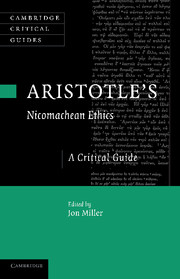Book contents
- Frontmatter
- Contents
- Contributors
- Acknowledgments
- Abbreviations and transliteration
- Introduction
- Part I Textual issues
- Part II Happiness
- Part III Philosophical psychology
- Chapter 5 Aristotle???s definition of non-rational pleasure and pain and desire
- Chapter 6 Non-rational desire and Aristotle???s moral psychology
- Chapter 7 Aristotle, agents, and actions
- Chapter 8 Perfecting pleasures
- Chapter 9 Inappropriate passion
- Part IV Virtues
- Bibliography
- Index
Chapter 7 - Aristotle, agents, and actions
Published online by Cambridge University Press: 07 September 2011
- Frontmatter
- Contents
- Contributors
- Acknowledgments
- Abbreviations and transliteration
- Introduction
- Part I Textual issues
- Part II Happiness
- Part III Philosophical psychology
- Chapter 5 Aristotle???s definition of non-rational pleasure and pain and desire
- Chapter 6 Non-rational desire and Aristotle???s moral psychology
- Chapter 7 Aristotle, agents, and actions
- Chapter 8 Perfecting pleasures
- Chapter 9 Inappropriate passion
- Part IV Virtues
- Bibliography
- Index
Summary
Habituation, actions, and character
At the heart of Aristotle’s account of ethical upbringing is habituation. At least all of the virtues of character – justice, generosity, temperance, courage, and so on – just are habituated states brought about by the repeated doing of actions of a certain ethical type. We are not born courageous or cowardly (although we may have natural dispositions in one direction or the other); rather, we are made courageous or cowardly insofar as we have engaged in courageous or cowardly actions in our lives. Engaging in actions of a certain type gives rise to the corresponding habituated state of character. In short, “we become just by doing just things, temperate by doing temperate things, and courageous by doing courageous things” (N.E. ii.1, 1103a34–b2). Let us call this idea “the habituation principle” (HP). As the explicit analogy with craft (technê) in N.E. ii.1 shows, the habituation principle is itself value neutral: one becomes a good harpist or a good builder if one acquires good building or harp-playing habits, but a bad one if not; similarly one becomes a virtuous person if she engages in virtuous acts, but a bad or vicious person if one doesn’t.
- Type
- Chapter
- Information
- Aristotle's Nicomachean EthicsA Critical Guide, pp. 170 - 190Publisher: Cambridge University PressPrint publication year: 2011
- 6
- Cited by

